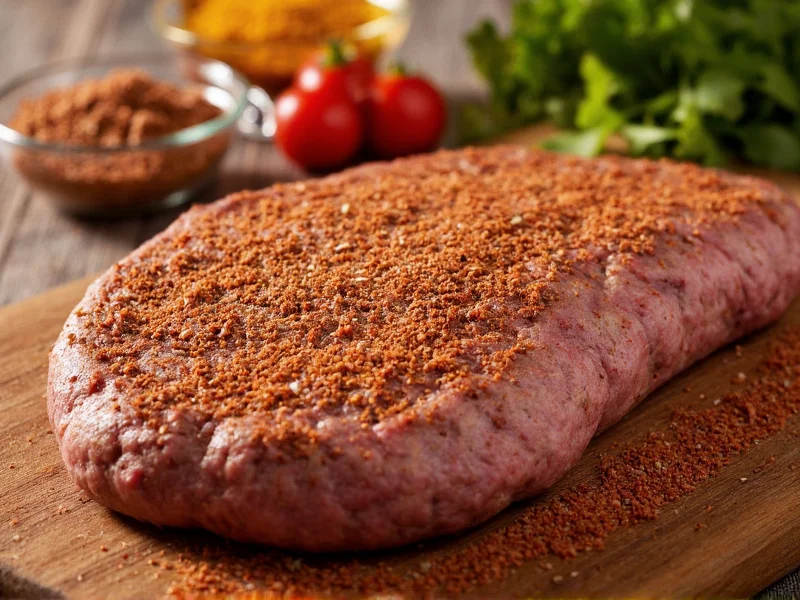The Science Behind Effective Hamburger Seasoning
Understanding why certain spices complement beef requires examining flavor chemistry. Salt remains the most crucial component as it enhances umami perception and helps retain moisture during cooking. Black pepper provides a subtle heat that balances beef's richness without overpowering it. Garlic and onion powders deliver consistent flavor throughout the patty since fresh versions would burn during cooking.
Research shows that fat-soluble compounds in spices like paprika and cumin bind effectively with beef's fat content, creating a more integrated flavor profile. This explains why oil-based spice blends often outperform dry rubs for ground meat applications. The ideal seasoning ratio maintains balance—too much salt draws out moisture, while excessive spices can create competing flavor notes that mask the beef's natural taste.
Homemade Hamburger Seasoning Recipe
Creating your own hamburger seasoning allows customization while avoiding preservatives and fillers found in many commercial blends. This basic formula serves as an excellent starting point for 1 pound of ground beef:
| Ingredient | Amount | Function |
|---|---|---|
| Kosher salt | 1 ½ tsp | Moisture retention, flavor enhancement |
| Freshly ground black pepper | 1 tsp | Balances richness, adds complexity |
| Garlic powder | ¾ tsp | Consistent savory notes |
| Onion powder | ¾ tsp | Sweetness, depth |
| Paprika (sweet) | ½ tsp | Color, subtle sweetness |
| Mustard powder | ¼ tsp | Acidity, flavor enhancer |
Advanced Variations for Different Palates
Once you've mastered the basic hamburger seasoning blend, consider these regional and dietary adaptations:
American Classic Style
Add ¼ teaspoon of celery salt and a pinch of cayenne pepper to the base recipe. This variation enhances the traditional diner-style burger experience while providing subtle heat that complements cheeseburgers particularly well.
Southwest Flavor Profile
Replace sweet paprika with smoked paprika and add ½ teaspoon of ground cumin and ¼ teaspoon of chili powder. This blend works exceptionally well with leaner grass-fed beef that benefits from additional flavor complexity.
Health-Conscious Alternative
For those monitoring sodium intake, reduce salt to 1 teaspoon and add ¼ teaspoon of nutritional yeast for umami depth. Incorporate dried herbs like oregano and thyme (⅛ teaspoon each) to compensate for reduced saltiness while maintaining flavor complexity.
When and How to Apply Hamburger Seasoning
The timing of seasoning application significantly affects burger quality. Contrary to popular belief, seasoning ground beef too far in advance draws out moisture through osmosis, resulting in drier patties. The optimal approach involves:
- Gently mix seasoning into cold ground beef just before forming patties
- Avoid overworking the meat to prevent toughening
- Create a slight indentation in the center of each patty to prevent bulging during cooking
- Season exterior with additional salt only during the final minute of cooking
Professional chefs recommend using 1.5% seasoning by weight of the ground beef for optimal flavor without overwhelming the meat's natural taste. For standard 6-ounce patties, this translates to approximately 1½ teaspoons of seasoning blend.
Common Hamburger Seasoning Mistakes to Avoid
Even experienced cooks make these critical errors when preparing hamburger seasoning:
- Over-seasoning - Using too much blend masks the beef's natural flavor
- Adding fresh garlic/onion - These burn during cooking, creating bitter compounds
- Mixing seasoning too early - Causes moisture loss and texture issues
- Using old spices - Ground spices lose potency after 6 months
- Ignoring beef quality - Premium seasoning can't compensate for poor-quality meat
Storage Guidelines for Homemade Seasoning
Proper storage maintains your hamburger seasoning's potency. Store in an airtight container away from light and heat. Glass jars with tight-sealing lids work best. Most homemade blends retain optimal flavor for 3-4 months when stored properly. For extended shelf life, freeze the blend in ice cube trays covered with oil, then transfer the frozen cubes to freezer bags.











 浙公网安备
33010002000092号
浙公网安备
33010002000092号 浙B2-20120091-4
浙B2-20120091-4